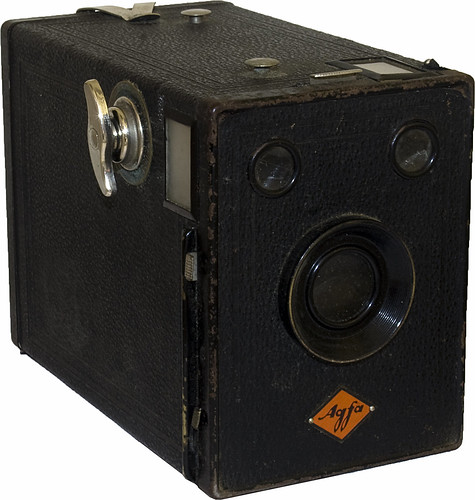Difference between revisions of "Agfa Box I"
(Noted 'special protective lens' in brochure) |
Hanskerensky (talk | contribs) (Added link to information page) |
||
| (4 intermediate revisions by 2 users not shown) | |||
| Line 9: | Line 9: | ||
}} | }} | ||
</div> | </div> | ||
| − | The '''Box I''' is a basic box camera for 6x9 exposures on 120 film (Agfa's film size B2). It is metal-bodied, with leatherette covering. It is Agfa's model 54, and the simpler of two box cameras listed in Agfa's brochure of the early 1930s (the other is model 64, the [[Agfa Box-Spezial|Box-Spezial]]).<ref name=AP>''Die Agfa Photographie''; brochure of the early 1930s (no earlier than 1931, since the [[Agfa Billy Jgetar 8.8]] has been redesignated as the Billy I, but still listing all but the largest of the [[Agfa Standard|Standard]] cameras, discontinued in 1933 according to McKeown).</ref> McKeown dates the camera to about 1930-33.<ref name=McK>{{McKeown12}} p20.</ref> | + | The '''Box I''' is a basic box camera for 6x9 exposures on [[120 film]] (Agfa's film size B2). It is metal-bodied, with leatherette covering. It is Agfa's model 54, and the simpler of two box cameras listed in Agfa's brochure of the early 1930s (the other is model 64, the [[Agfa Box-Spezial|Box-Spezial]]).<ref name=AP>''Die Agfa Photographie''; brochure of the early 1930s (no earlier than 1931, since the [[Agfa Billy Jgetar 8.8]] has been redesignated as the Billy I, but still listing all but the largest of the [[Agfa Standard|Standard]] cameras, discontinued in 1933 according to McKeown).</ref> McKeown dates the camera to about 1930-33.<ref name=McK>{{McKeown12}} p20.</ref> |
| − | The Box I has an 'I'-and-'B' shutter, without a cable-release socket. It has a meniscus lens (the brochure states the lens and shutter are protected behind a 'special protective lens' at the front),<ref name=AP/> and [[Viewfinder#Watson finder|Watson-type viewfinders]] (with a small ground-glass screen rather than the condenser lens of a brilliant finder) for vertical and horizontal use. There is a pull-out tab above the lens, which | + | The Box I has an 'I'-and-'B' shutter, without a cable-release socket (and there is no tripod bush). It has a meniscus lens (the brochure states the lens and shutter are protected behind a 'special protective lens' at the front),<ref name=AP/> and [[Viewfinder#Watson finder|Watson-type viewfinders]] (with a small ground-glass screen rather than the condenser lens of a brilliant finder) for vertical and horizontal use. There is a pull-out tab above the lens, which selects one of three fixed apertures (as it does on the Box-Spezial); this control is not mentioned in the brochure cited, though it can be seen in the illustration of the camera). There is a ridge projecting from the camera's right side, protecting the shutter controls from accidental use; the Box-Spezial also has this. |
==Notes== | ==Notes== | ||
<references/> | <references/> | ||
| + | |||
| + | ==Links== | ||
| + | *[https://kameramuseum.de/objekte/agfa-box-54-box-1/ Agfa Box 54 “Box 1” page] at the [https://kameramuseum.de/ Deutsches kameramuseum] (in German) | ||
[[Category:German 6x9 box]] | [[Category:German 6x9 box]] | ||
| − | [[Category:Agfa]] | + | [[Category:Agfa|Box 1]] |
| + | [[Category:B|Box 1 Agfa]] | ||
| + | [[Category:120 film]] | ||
Latest revision as of 04:53, 5 September 2023

|
| image by John-Henry Collinson (Image rights) |
The Box I is a basic box camera for 6x9 exposures on 120 film (Agfa's film size B2). It is metal-bodied, with leatherette covering. It is Agfa's model 54, and the simpler of two box cameras listed in Agfa's brochure of the early 1930s (the other is model 64, the Box-Spezial).[1] McKeown dates the camera to about 1930-33.[2]
The Box I has an 'I'-and-'B' shutter, without a cable-release socket (and there is no tripod bush). It has a meniscus lens (the brochure states the lens and shutter are protected behind a 'special protective lens' at the front),[1] and Watson-type viewfinders (with a small ground-glass screen rather than the condenser lens of a brilliant finder) for vertical and horizontal use. There is a pull-out tab above the lens, which selects one of three fixed apertures (as it does on the Box-Spezial); this control is not mentioned in the brochure cited, though it can be seen in the illustration of the camera). There is a ridge projecting from the camera's right side, protecting the shutter controls from accidental use; the Box-Spezial also has this.
Notes
- ↑ 1.0 1.1 Die Agfa Photographie; brochure of the early 1930s (no earlier than 1931, since the Agfa Billy Jgetar 8.8 has been redesignated as the Billy I, but still listing all but the largest of the Standard cameras, discontinued in 1933 according to McKeown).
- ↑ McKeown, James M. and Joan C. McKeown's Price Guide to Antique and Classic Cameras, 12th Edition, 2005-2006. USA, Centennial Photo Service, 2004. ISBN 0-931838-40-1 (hardcover). ISBN 0-931838-41-X (softcover). p20.
Links
- Agfa Box 54 “Box 1” page at the Deutsches kameramuseum (in German)